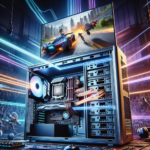Understanding the Impact of CPU on E-Sports Performance

Understanding the Impact of CPU on E-Sports Performance
In the world of e-sports, where milliseconds can determine the difference between victory and defeat, the performance of your gaming rig is paramount. While graphics cards often steal the spotlight, the Central Processing Unit (CPU) plays an equally crucial role in ensuring smooth gameplay and competitive edge. This article delves into the impact of the CPU on e-sports performance, exploring its significance, how it affects gameplay, and what to consider when choosing a CPU for e-sports.
The Role of the CPU in Gaming
What is a CPU?
The Central Processing Unit (CPU) is often referred to as the “brain” of the computer. It performs the majority of the processing inside a computer, executing instructions from programs and managing tasks. In gaming, the CPU handles various functions such as game logic, physics calculations, and managing the communication between different hardware components.
CPU vs. GPU: Understanding the Difference
While the Graphics Processing Unit (GPU) is responsible for rendering images, videos, and animations, the CPU handles the overall game mechanics and logic. Both components are essential for a seamless gaming experience, but they serve different purposes. The CPU’s role becomes particularly significant in e-sports titles that require quick decision-making and real-time strategy.
How CPU Affects E-Sports Performance
Frame Rates and Smooth Gameplay
One of the most critical aspects of e-sports performance is the frame rate, measured in frames per second (FPS). A higher frame rate results in smoother gameplay, which is crucial for fast-paced games like first-person shooters (FPS) and real-time strategy (RTS) games. The CPU’s ability to process game logic and physics calculations efficiently directly impacts the frame rate. A powerful CPU can handle more calculations per second, leading to higher FPS and a more responsive gaming experience.
Latency and Input Lag
Latency, or input lag, is the delay between a player’s action and the corresponding response on the screen. In e-sports, even a slight delay can be detrimental. The CPU plays a significant role in minimizing latency by quickly processing inputs and executing game commands. A high-performance CPU ensures that inputs are registered and executed with minimal delay, providing a competitive edge to players.
Multitasking and Streaming
Many e-sports players also engage in live streaming their gameplay. Streaming requires additional processing power as the CPU needs to handle both the game and the streaming software simultaneously. A robust CPU with multiple cores and threads can efficiently manage multitasking, ensuring that the game runs smoothly while streaming without compromising performance.
Choosing the Right CPU for E-Sports
Core Count and Thread Count
Modern CPUs come with multiple cores and threads, allowing them to handle multiple tasks simultaneously. For e-sports, a CPU with at least four cores and eight threads is recommended. However, more cores and threads can provide better multitasking capabilities, especially for players who stream their gameplay.
Clock Speed
Clock speed, measured in gigahertz (GHz), indicates how many cycles a CPU can perform per second. Higher clock speeds generally result in better performance, especially in single-threaded tasks common in many e-sports titles. A CPU with a high base clock speed and the ability to boost to even higher speeds can significantly enhance gaming performance.
Cache Size
The CPU cache is a small amount of high-speed memory located on the CPU itself. It stores frequently accessed data and instructions, reducing the time it takes for the CPU to retrieve this information. A larger cache size can improve performance in games that require quick access to data, contributing to smoother gameplay.
Compatibility and Future-Proofing
When choosing a CPU, it’s essential to consider compatibility with your motherboard and other components. Additionally, investing in a CPU with modern architecture and features can future-proof your system, ensuring it remains competitive as new games and technologies emerge.
Popular CPUs for E-Sports
Intel Core i9-12900K
The Intel Core i9-12900K is a high-end CPU that offers exceptional performance for e-sports. With 16 cores and 24 threads, it can handle demanding games and multitasking with ease. Its high clock speeds and advanced architecture make it a top choice for competitive gamers.
AMD Ryzen 9 5900X
The AMD Ryzen 9 5900X is another excellent option for e-sports enthusiasts. With 12 cores and 24 threads, it provides outstanding multitasking capabilities. Its impressive single-threaded performance ensures smooth gameplay in fast-paced e-sports titles.
Intel Core i5-12600K
For gamers on a budget, the Intel Core i5-12600K offers a great balance of performance and affordability. With 10 cores and 16 threads, it can handle most e-sports titles with ease. Its high clock speeds and efficient architecture make it a solid choice for competitive gaming.
Optimizing CPU Performance for E-Sports
Overclocking
Overclocking involves increasing the clock speed of your CPU beyond its factory settings to achieve better performance. While overclocking can provide a significant boost in gaming performance, it also generates more heat and can reduce the lifespan of your CPU if not done correctly. Proper cooling solutions and careful monitoring are essential when overclocking.
Cooling Solutions
Efficient cooling is crucial for maintaining optimal CPU performance. High-performance air coolers or liquid cooling systems can help dissipate heat effectively, ensuring that your CPU operates at its best even during intense gaming sessions. Proper airflow within your PC case also plays a vital role in keeping temperatures in check.
Regular Maintenance
Keeping your system clean and free of dust is essential for maintaining CPU performance. Dust buildup can obstruct airflow and cause overheating, leading to performance throttling. Regularly cleaning your PC and ensuring proper ventilation can help prevent these issues.
FAQ
How important is the CPU for e-sports compared to the GPU?
Both the CPU and GPU are crucial for e-sports performance, but their importance varies depending on the game. The CPU handles game logic, physics calculations, and input processing, while the GPU is responsible for rendering graphics. In CPU-intensive games, a powerful CPU is essential for smooth gameplay, while in graphically demanding games, the GPU takes precedence.
Can I use an older CPU for e-sports gaming?
While older CPUs can still run many e-sports titles, they may struggle with newer games and multitasking, especially if you plan to stream your gameplay. Investing in a modern CPU with multiple cores and high clock speeds can provide a better gaming experience and future-proof your system.
Is overclocking my CPU worth it for e-sports?
Overclocking can provide a noticeable performance boost in e-sports, especially in CPU-intensive games. However, it also generates more heat and can reduce the lifespan of your CPU if not done correctly. Ensure you have proper cooling solutions and monitor temperatures closely if you decide to overclock.
How does the CPU affect input lag in e-sports?
The CPU processes inputs and executes game commands, so a high-performance CPU can minimize input lag by quickly registering and processing actions. This is crucial in e-sports, where even a slight delay can impact gameplay and competitiveness.
What is the best CPU for streaming e-sports gameplay?
CPUs with multiple cores and threads, such as the Intel Core i9-12900K or AMD Ryzen 9 5900X, are excellent choices for streaming e-sports gameplay. These CPUs can handle both gaming and streaming tasks simultaneously without compromising performance.
Conclusion
The CPU plays a vital role in e-sports performance, impacting frame rates, latency, and multitasking capabilities. Choosing the right CPU can provide a competitive edge, ensuring smooth gameplay and minimal input lag. Whether you’re a professional e-sports player or an enthusiast, investing in a high-performance CPU tailored to your gaming needs is essential for achieving the best possible experience. By understanding the impact of the CPU on e-sports performance and optimizing your system accordingly, you can enhance your gaming prowess and stay ahead of the competition.



